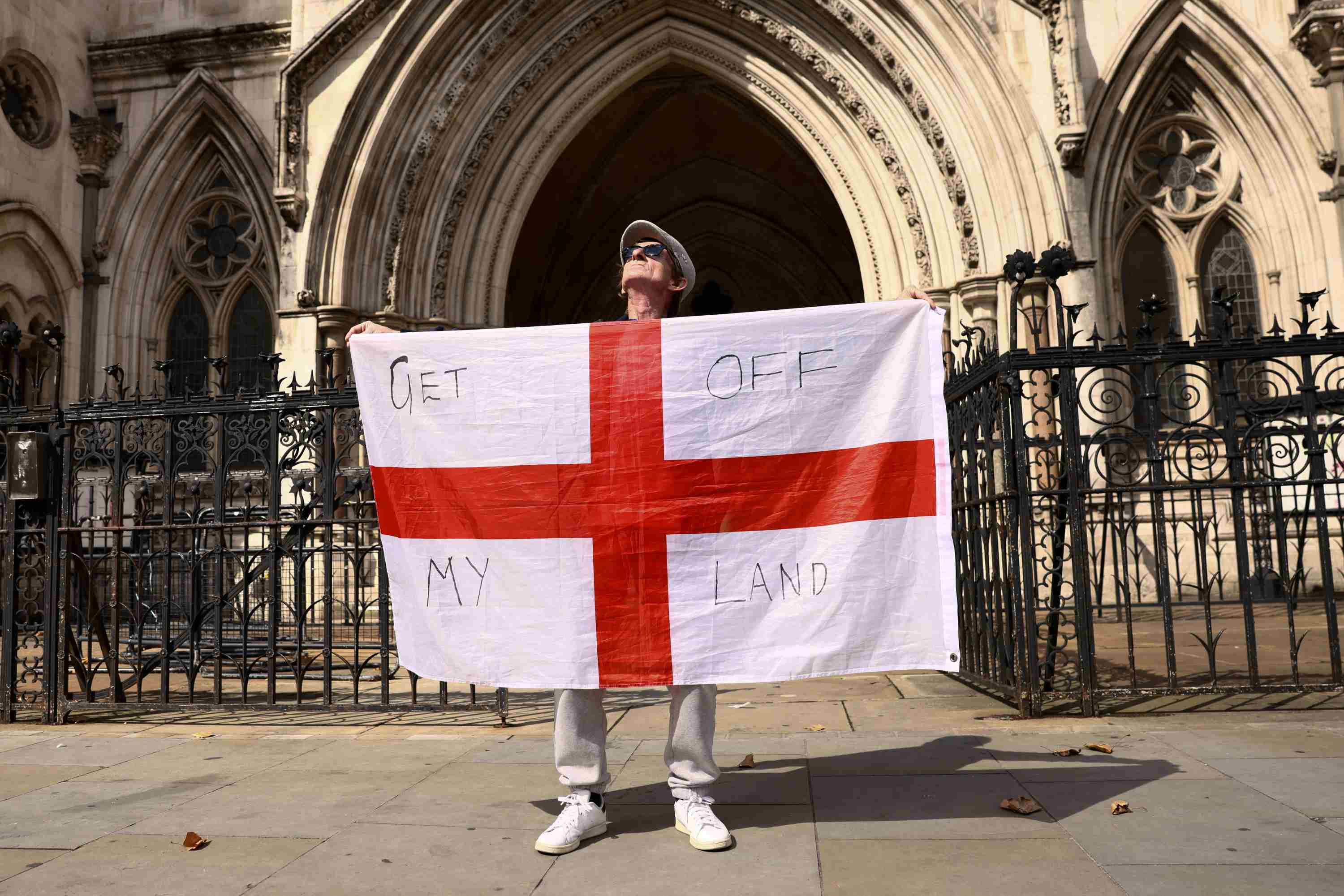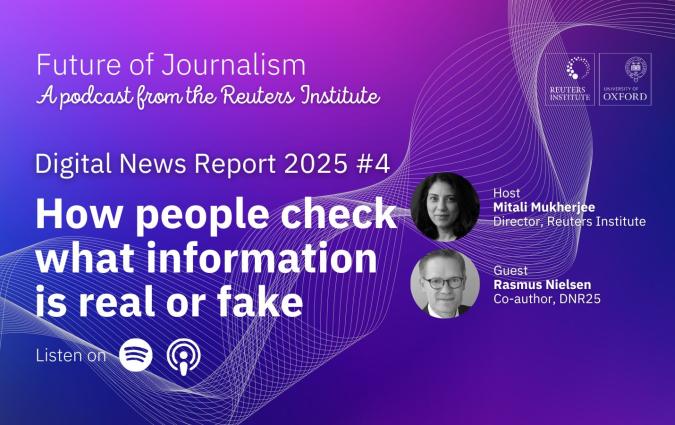“It’s like drinking from polluted water”: How the UK media gets immigration coverage wrong and how to fix it

A protester holds up England's St George's flag outside the Royal Courts of Justice in London, Britain, as the Court of Appeal rules on whether migrants can be removed from a hotel in Epping, August 29, 2025. The British government won an appeal against the court ruling requiring asylum seekers to be temporarily evicted from the hotel. REUTERS/Jack Taylor
In the midst of bubbling unrest around immigration in the UK, some voices are calling for the country to withdraw from the European Convention on Human Rights (ECHR). These calls often appear to be rooted in misconceptions about the international treaty and its impact on immigration control.
Journalists have propagated these misconceptions, according to a new report from the Bonavero Institute of Human Rights at the University of Oxford, which examined the public debate surrounding the ECHR in relation to immigration in the UK.
The Bonavero report’s authors, Victoria Adelmant, Alice Donald and Başak Çalı, reviewed 379 news stories and opinion pieces from UK news outlets mentioning the ECHR between January and June 2025. They found misreporting, inaccurate, and incomplete information, as well as an overwhelming focus on immigration cases.
“Politicians, journalists and commentators may legitimately hold different views on immigration and human rights. But mischaracterising how the law operates does a disservice to the public,” Çalı said.
46 European states signed the ECHR, which was directly inspired by the UN’s Universal Declaration of Human Rights. Its 18 articles outline rights including those to life, liberty and security, and protect individuals against torture, slavery and discrimination.
The ECHR’s articles 2,3, and 8 can be used to stop deportations on the respective grounds that, if deported, the individual involved would face death, torture, or that it would be “unduly harsh” for their family.
News coverage of immigration and public opinion are connected. A 2022 analysis by Financial Times journalist John Burn-Murdoch showed UK public concern about immigration historically tracked mentions of immigration in the Daily Mail.
I spoke to Adelmant, Donald and Çalı about the findings of their report and about how journalists can do better when reporting on legal issues.
How immigration stories are misreported
The report identified three types of misreporting on immigration and the ECHR: presenting overturned decisions as current, reporting unaccepted arguments as if they were the basis for judicial decisions, and misrepresenting the actual basis of judicial decisions.
Facts were sometimes reported inaccurately and sometimes incompletely.
“In terms of discussions about the law and the ECHR, we also found that there was no effort to understand the legal framework, what it says, or how it works,” said Çalı, director of research at the Bonavero Institute.
The authors also observed a pattern in which a particular framing of a case, which may be misleading, would first be reported by one news outlet, and then repeated across many others as the story was ‘picked up’.
“You would have a certain framing of a case that would spiral or proliferate, and sometimes, over time, it would also become more and more inaccurate,” Adelmant explained.
This would seem to indicate that the journalists replicating the story for their own news outlets were not going back to read the original tribunal case on which the first article was based.
In some cases, the initial reports appeared in right-leaning newspapers and were seemingly purposefully framed to portray the ECHR negatively, added Donald, a professor in human rights law at Middlesex University in London.
Most British newspapers take a political stance, and discussions about the possibility of the country leaving the ECHR and reforming its national human rights law are largely the domain of the right wing.
However, the same framing would then be repeated in other news outlets, including left-leaning newspapers, which don’t share the same views or intent.
The tale of the chicken nuggets
One of the most infamous stories about the ECHR and immigration reported in British media concerns a man whose deportation was supposedly halted because his son didn’t like foreign chicken nuggets. This absurd account, which appeared in news reports from numerous outlets (The Telegraph, Daily Mail, The Independent) and was mentioned by prominent politicians, was “completely erroneously reported,” Donald said.
In fact, she explained, the consideration of the son’s food preferences was not the basis of the initial decision not to deport the man, and this decision was actually later overturned.
This illustrates a “phenomenon of stories that take on a life of their own and become accepted wisdom, without their origin being checked,” Donald said.
This ratcheting effect allows misreported stories to make their way into politicians’ statements and think tank reports, which are then re-reported on by news outlets.
“Again, it reinforces a trivial case, even though the root of it was always wrong,” Donald said. “The most alarming thing is that it is extended into the political sphere, and not just news reports.”
A focus on individual stories over context
All three ways in which the researchers identified that stories about the ECHR and immigration are commonly misreported reflect a tendency by journalists to focus on a specific detail of a case and not expand on the broader context, Adelmant said.
“There is a bit of complexity, and you have to explain how appeals work for something not to then be misleading,” she added.
These individual stories, such as the chicken nuggets case, are not only reported once but brought back in as if to provide context in subsequent articles about other specific cases. “It almost created feedback loops, where you had this repetition of the same cases over and over, and they were always brought back in again to create a bigger picture,” Adelmant said.
And yet information that would have actually served to further inform readers about the legal processes involved would not be included.
One significant omission from a lot of the coverage reviewed by Adelmant, Donald and Çalı concerns the broader role of the ECHR.
“The ECHR is not a convention that is about immigration policy; it's about a lot of other things. It's about LGBTQ rights. It's about violence against women. It's about the protection of the rights of persons with disabilities,” Çalı explained.
The ECHR’s enforcer, the European Court of Human Rights, has only ruled against the UK 13 times out of 29 judgements concerning the deportation of a foreign national from the country since 1980.
How journalists can do better
Using individual stories to frame discussions about the ECHR and immigration is at the root of the problem, Donald believes.
“Individual stories are very compelling, and when you see something that appears absurd, like the idea that a man could escape deportation because of his child's taste in fast food, there's a natural tendency to latch onto it,” she said. But when these misleading stories are used to frame the entire issue of the ECHR’s role in immigration control, “it’s like drinking from polluted water,” Donald said.
Çalı also warns against hyper-focusing on individual cases when writing about the ECHR, instead recommending journalists view it in the context of human rights as a whole.
"Journalists have to see that human rights protect a full spectrum of rights and a full spectrum of human beings,” she said. “As journalists, they have an obligation to respect, protect and uphold human rights. So I think we also have to go back to the big principles about what journalism is for.”
The fault doesn’t only lie with the media. Part of the problem, the authors write, is a dearth of official data on human rights-based appeals against deportation from the Home Office, the UK government department that manages immigration. They call for accurate and up-to-date data to help journalists contextualise the cases they’re reporting.
However, the authors also noticed other mistakes in reporting about legal issues.
Çalı mentioned frequent mix-ups of the European Court of Human Rights with the Court of Justice of the European Union [the ECHR and its court are separate from the EU].
“There’s a lack of knowledge about, not just about the names of courts, but also the names of international organisations and institutions and how they work. The Council of Europe [again, not EU] has a web page which is called, ‘do not get confused’.”
In recent coverage relating to Israel’s actions in Gaza, journalists have also recently confused the International Court of Justice with the International Criminal Court, Çalı added. The former is a court of states, while the latter prosecutes individuals.
“Just even the names of courts are being confused, let alone the meanings of judgments,” she said.
Some of this may be explained by the fact that a lot of news outlets no longer have specialist legal reporters, Donald said. But there are user-friendly resources available from the courts themselves, she said, to help generalist journalists inform themselves.
“There's no excuse for journalists or politicians to make such basic errors wilfully or otherwise,” Donald said.
The Reuters Institute’s head of editorial, Eduardo Suárez, is part of the Bonavero Institute’s management committee. The Reuters Institute and the Bonavero Institute are both part of the University of Oxford.
In every email we send you'll find original reporting, evidence-based insights, online seminars and readings curated from 100s of sources - all in 5 minutes.
- Twice a week
- More than 20,000 people receive it
- Unsubscribe any time







